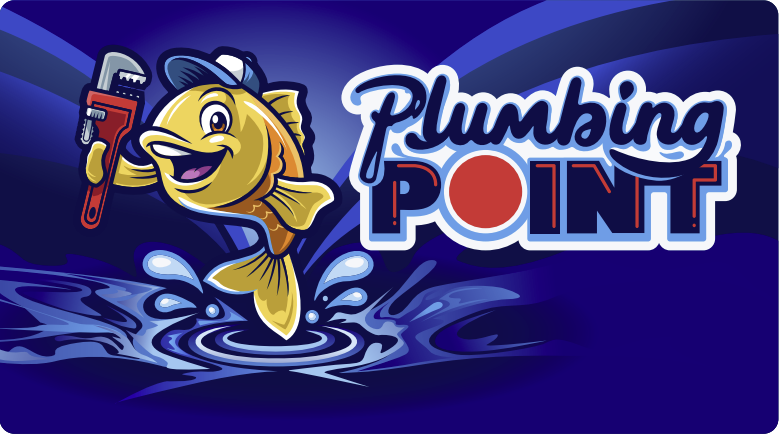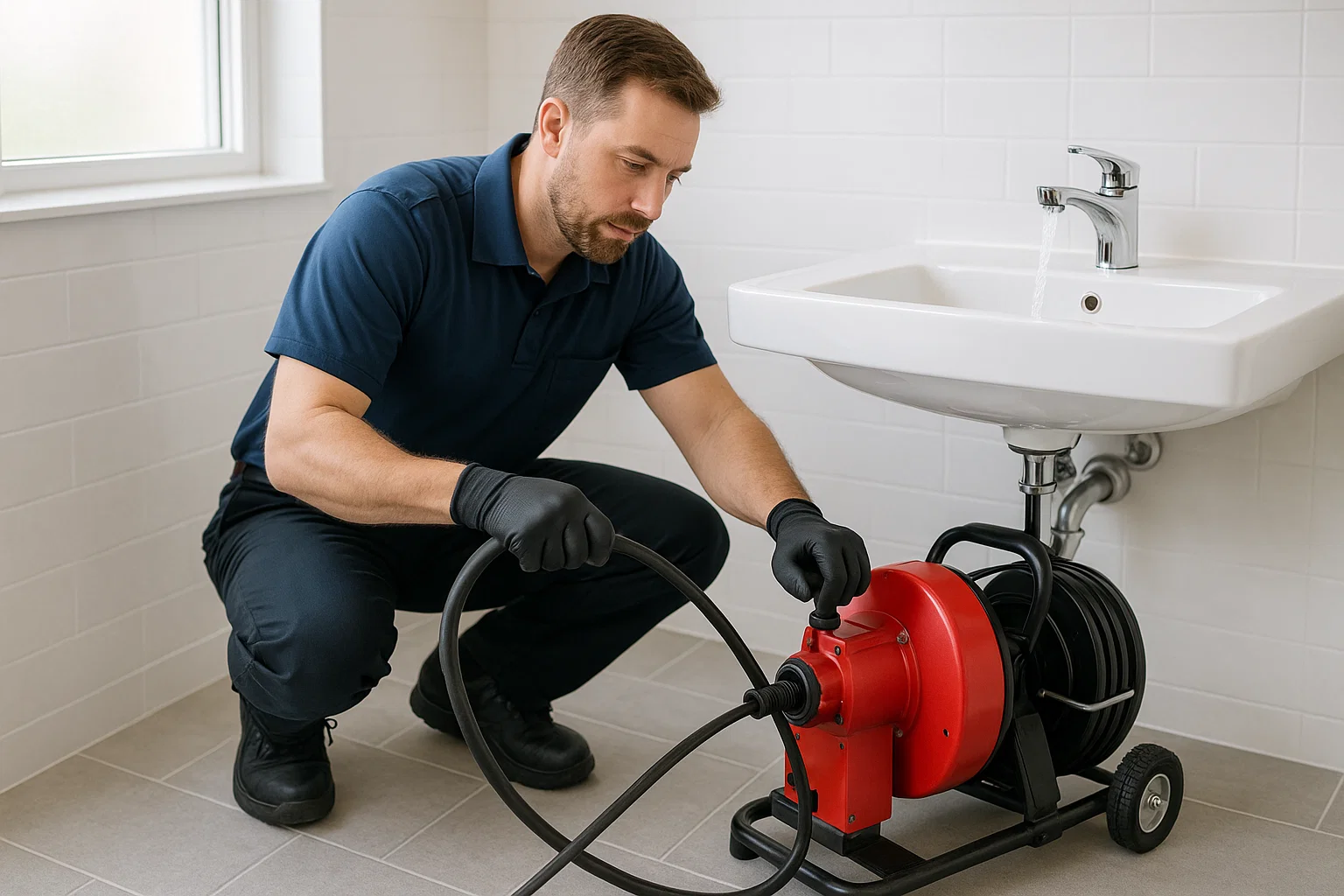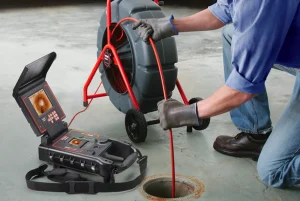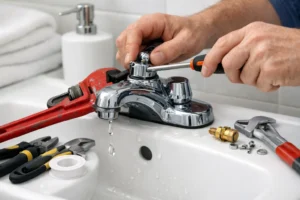|
Getting your Trinity Audio player ready...
|
At Plumbing Point Inc, we help Santa Clara homeowners understand what’s happening inside their drains — and how regular cleaning can prevent future plumbing disasters.
In this complete guide, we’ll explain how drain systems work, what causes clogs, and the best solutions — from simple home maintenance to professional hydro jetting.
Understanding Your Drain System
Your home’s drain system is a network of pipes that carries wastewater away from sinks, tubs, toilets, and appliances into the main sewer or septic line.
When water flows slowly or backs up, it means something is obstructing this pathway — often a buildup of grease, hair, soap scum, or debris.
There are two main types of drainage systems in most homes:
1. Fixture Drains
These are the smaller lines directly connected to sinks, tubs, and showers. They’re most vulnerable to clogs from soap, hair, and debris.
2. Main Sewer Line
All smaller drains connect to this larger pipe, which leads wastewater out of your home. When multiple fixtures back up at once, the problem is usually in this main line.
Understanding where the blockage occurs helps determine whether a DIY fix or professional drain cleaning service is needed.
Common Causes of Drain Clogs
Clogs don’t happen overnight — they develop slowly as residue builds up inside pipes. Here are the most common culprits:
- Grease and Oil: When poured down kitchen sinks, grease cools and hardens, sticking to pipe walls.
- Hair: Bathroom sinks and showers are notorious for hair buildup that traps soap and lint.
- Soap Scum: Hard water minerals react with soap to form sticky residue inside pipes.
- Food Waste: Coffee grounds, eggshells, rice, and pasta expand in water and clog kitchen drains.
- Foreign Objects: Small toys, wipes, cotton swabs, and hygiene products don’t dissolve and can block pipes.
- Tree Roots: In outdoor lines, roots seek moisture and can invade underground sewer pipes, causing major blockages.
Identifying the cause helps choose the right cleaning method — from drain snaking to hydro jetting.
Signs You Need Drain Cleaning
You don’t have to wait until your sink stops draining completely. Early warning signs indicate a clog is forming:
- Water drains slower than usual
- Gurgling or bubbling noises from pipes
- Foul or musty odors from drains
- Multiple fixtures draining slowly
- Frequent toilet backups
- Water pooling around floor drains
If you notice any of these symptoms, call a professional plumber before the issue worsens — early drain cleaning can save you from a major repair later.
DIY Drain Cleaning Tips
Before calling in the professionals, try these safe and simple DIY methods to clear minor clogs:
1. Hot Water Flush
Pouring boiling water down the drain can dissolve soap and grease residues. Repeat several times for best results.
2. Baking Soda and Vinegar
Mix one cup of baking soda followed by one cup of vinegar. Let it fizz for 15–20 minutes, then rinse with hot water. This natural method helps break down small blockages and neutralize odors.
3. Plunger
A plunger can dislodge minor clogs in sinks and tubs. Use steady, firm pressure to create suction and push the clog free.
4. Drain Snake (Auger)
A hand auger can reach deeper clogs in fixture drains. Insert it slowly, twist to catch debris, and pull it out carefully.
Avoid chemical drain cleaners.
While tempting, these harsh products can corrode pipes, damage seals, and harm the environment. For persistent clogs, professional service is safer and more effective.
Professional Drain Cleaning Methods
When DIY methods don’t work, professional plumbers use specialized equipment to thoroughly clean and restore your drains.
1. Drain Snaking
A motorized auger extends deep into pipes to break apart or retrieve blockages. It’s effective for hair, food, and minor obstructions in household drains.
2. Hydro Jetting
Hydro jetting uses high-pressure water streams (up to 4,000 PSI) to completely flush out grease, scale, and debris from inside pipes.
It not only removes existing clogs but also cleans pipe walls, preventing future buildup.
This method is ideal for main sewer lines and heavily used drains.
3. Video Camera Inspection
Modern plumbers use small waterproof cameras to inspect the inside of pipes. This helps pinpoint the exact location and cause of the blockage, reducing unnecessary digging or guesswork.
4. Root Removal
For outdoor or sewer line clogs, specialized cutting tools or hydro jetting attachments remove invading tree roots without damaging the pipes.
Benefits of Regular Drain Cleaning
Routine professional drain maintenance offers long-term protection and savings. Key benefits include:
- Prevents major blockages: Early cleaning keeps pipes clear before clogs form.
- Eliminates odors: Removes bacteria, grease, and residue causing foul smells.
- Improves drainage speed: Restores smooth water flow throughout your plumbing system.
- Extends pipe lifespan: Reduces corrosion and pressure buildup.
- Saves money: Prevents costly emergency plumbing repairs and water damage.
For most homes, scheduling professional drain cleaning once a year keeps the system in top condition.
Hydro Jetting vs. Traditional Drain Cleaning
| Feature | Traditional Snaking | Hydro Jetting |
|---|---|---|
| Effectiveness | Removes blockages only | Cleans entire pipe interior |
| Best For | Minor clogs and hair buildup | Heavy grease, scale, roots |
| Speed | Fast | Slightly longer setup time |
| Longevity | May need repeat service | Prevents future clogs |
| Safety | Safe for most drains | Requires professional handling |
If your drains clog frequently or you’ve had recurring issues, hydro jetting provides a more permanent solution.
Drain Cleaning for Different Areas of the Home
Kitchen Drains
Grease, food scraps, and dish soap residue are common culprits. Avoid pouring oil or food down the drain and use strainers to catch debris.
Bathroom Drains
Hair and soap scum clog sinks and showers. Regularly clean drain stoppers and use mesh screens to trap hair.
Laundry & Utility Drains
Lint and detergent buildup can block laundry drains. A lint trap and occasional hot water flush help maintain flow.
Outdoor & Floor Drains
Yard debris and dirt can clog floor drains or gutters. Regular cleaning before the rainy season prevents flooding.
When to Call a Professional Plumber
Contact a licensed plumbing professional if:
- Multiple drains are backing up at once
- DIY methods fail to clear the clog
- You hear gurgling when using other fixtures
- There’s sewage smell or water pooling near drains
- You suspect tree roots or main line blockage
Prompt action prevents structural damage, mold growth, and sewer backups — issues that can cost thousands to repair.
Eco-Friendly Drain Cleaning Solutions
Environmentally conscious homeowners prefer non-toxic maintenance. Consider:
- Enzyme Cleaners: Natural bacteria-based products that digest organic waste safely.
- Water-Saving Fixtures: Reduce overall strain on drainage systems.
- Regular Hydro Jetting: Uses only water — no chemicals.
At Plumbing Point Inc, we prioritize sustainable methods that protect your home and the environment.
Professional Drain Cleaning Services in Santa Clara
At Plumbing Point Inc, we specialize in comprehensive drain cleaning for homes and businesses throughout Santa Clara and surrounding areas.
Our licensed plumbers use advanced diagnostic tools, eco-safe methods, and years of experience to ensure your drains run like new.
Whether it’s a slow sink, stubborn clog, or complete sewer backup — we provide 24/7 emergency plumbing services to restore flow safely and efficiently.
To Summarize: Keep Your Drains Healthy
Clogged drains are more than just an inconvenience — they’re early warning signs of plumbing trouble.
Regular cleaning and maintenance not only prevent costly emergencies but also keep your home safe, sanitary, and efficient.
Before you face a complete blockage or water damage, schedule a professional drain inspection today.
Call Plumbing Point Inc — Santa Clara’s trusted drain cleaning experts — for fast, reliable service you can count on.
FAQs
How often should I clean my drains?
At least once a year for maintenance, or more frequently if you experience slow drains.
What’s the best way to prevent clogs?
Avoid pouring grease, hair, or food down drains, and use strainers in sinks and tubs.
Is hydro jetting safe for old pipes?
Yes, when performed by a professional who adjusts the pressure to match pipe condition.
Can chemical cleaners damage pipes?
Yes. Repeated use can corrode plumbing and cause leaks. Opt for professional cleaning instead.



